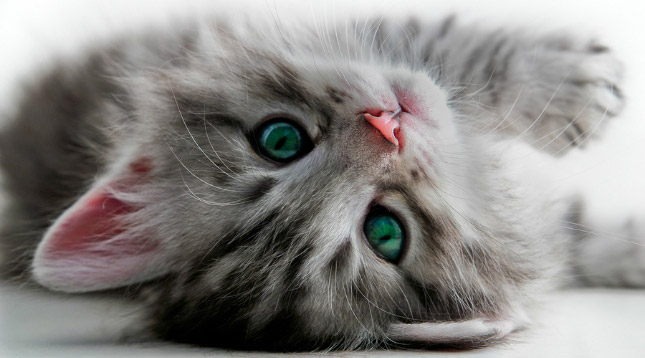Kitten Vaccinations For Your Feline Friend
December 27th, 2015 by Cherished Companions Animal Clinic

Have a new kitty? Here are 3 important kitten vaccinations
Congratulations on adding a kitten to your family! Those big ears. Those wide eyes. That playful personality.
Have you fallen in love yet? We hope so!
We’d like to introduce you to important kitten vaccinations for your Colorado kitty.
Kitten vaccinations can help protect your feline friend from many serious health problems.
We’ve also put together a few tips about the kitten vaccination process. (Think of these tips as a little extra catnip.) Scroll down to learn the essentials.
Okay, let’s chat about kitten vaccinations for Colorado cats…

FRCCP vaccination
(also known as the FVRCP vaccination)
Yes, the FRCCP vaccination will score you some points during your next game of Scrabble: F-R-C-C-P.
The good news is this kitten vaccination packs a mighty punch. It contains vaccines for four different cat diseases:
- Feline influenza is a viral respiratory disease that’s severe in kittens.
- Calicivirus is a serious cat virus that causes an upper respiratory infection.
- Chlamydia is a common respiratory infection in cats that’s highly contagious. It’s caused by bacteria.
- Feline distemper is a virus that causes the most common disease in cats. It’s highly contagious and lethal, especially in kittens.
As you can tell, this kitten vaccination helps protect against some nasty diseases!
Our veterinarians will give the FRCCP vaccination to your kitten in a series of three shots to make sure it takes effect. (One shot isn’t enough.)
Typically, the first shot is given when your kitten is six to eight weeks old. The last FRCCP vaccination is given when your kitty is 14 to 16 weeks old.
As far as what to expect in the future, your kitty will get another FRCCP vaccination at his or her one-year checkup. It’s good for three years. After that, the shot is given every three years.
Tip! If you think your cat may ever visit a boarding facility, they may ask you for up-to-date vaccination records for FRCCP. We’re happy to send your cat’s vaccination records, if you’d like us to do so.
If you live near Castle Rock, CO, give us a call: (303) 688-3757. Or:

Feline leukemia (FELV) vaccination
The FELV vaccination protects your cat from feline leukemia — a fatal viral infection.
Once again, kittens are particularly vulnerable.
Your cat can get FELV from coming into close contact with an infected cat.
Feline leukemia can cause blood disorders and some types of cancers. And it can really weaken your cat’s immune system.
Often times, cats that have FELV can’t fight off other diseases, and they die from the associated infections.
Early on, cats with FELV may not have any noticeable symptoms. Over weeks, months or even years, though, this disease can affect multiple areas in your cat’s body.
It causes a variety of symptoms, from infections, to weight loss, to a chronic fever.

Rabies vaccination
The rabies vaccination protects your cat from rabies.
Rabies is a viral disease spread through the bite of infected animals, such as bats or skunks. The rabies virus attacks nerve tissues, resulting in paralysis and death.
If your kitty is going to be an indoor cat, we realize the rabies vaccination may seem like a strange vaccination.
However, in rare cases, we have seen bats get into homes. A cat’s instinct is to go after the bat, and bat bites are tricky to see.
Just as important, the rabies vaccination is actually required for Colorado cats and dogs because rabies poses a health risk for humans.
There are some health exceptions to the requirements, though.
On your next visit to our clinic, our veterinarians are happy to help you determine whether your cat qualifies.
We’ll give your cat the rabies vaccination when he or she is a kitten, and then once the following year. (Each of these shots offer one year of protection.)
As for an ongoing vaccination schedule, your cat should get the rabies vaccination every three years.

What to expect from our kitten vaccination process
- Before each vaccination session, we always do a physical exam to make sure your kitten is healthy enough to receive the vaccines. Learn all the reasons why in: Pet vaccinations – 8 great questions from Colorado pet parents.
- Before starting a vaccination program at all, we recommend testing your kitten for feline leukemia (FELV) and feline immunodeficiency virus (FIV) — a fatal viral infection that interferes with your cat’s immune system. We want to ensure your kitten doesn’t have an untreatable illness that can affect you or your family.
- If your kitten is sick and showing symptoms of feline infectious peritonitis (FIP), we may suggest a test for that as well. FIP is a cat disease caused by a coronavirus. It spreads through direct, cat-to-cat contact and contact with contaminated surfaces. There is no cure for FIP. It can hide for lengths of time, and it’s considered fatal.
If you’ve just adopted a new kitten, you can see why a physical exam and these types of tests are so important. We’re here to help you make sure your cat is healthy!
—————–
Want to learn more?
Please check out our pet vaccination services.
If you’d like to schedule kitten vaccinations…
Call us at (303) 688-3757 or book your visit here.
—————-
Cherished Companions Animal Clinic is a veterinary clinic in Castle Rock, Colorado. Specializing in the care of cats and dogs, our goal is to help you and your pet feel more comfortable, keeping your stress to a minimum.
This article is intended to provide general guidance on kitten vaccinations. If you have specific questions or concerns, please contact your local veterinarian. (If you live in or around Castle Rock, we welcome your call.)
© 2015, Cherished Companions Animal Clinic